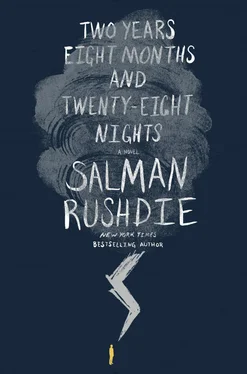— and here Omar the Ayyar interjected, Why, this is just like the story of the composer Casterbridge and the preacher Yusuf Ifrit, each accusing the other of being the pestilence, so maybe this is a new kind of sickness, a sickness that prevents human beings from knowing when they are sick and when they are in good health,
— but the jinnia princess had found her own story hidden within these other stories. She was thinking about her stricken father, about their own troubled story, more troubled than the story of the blacksmith and his wife or the composer and the preacher, and by accident her thoughts spilled out of her mouth, He never loved me, she said, I always worshipped my father but I knew I wasn’t the son he wanted. My inclination was towards philosophy, and if I had had my way I would have built myself a library life, happily lost in the labyrinth of language and ideas, but he needed a warrior, so I became one for him: the Lightning Princess, whose defenses shielded Qâf from the dark. The dark jinn didn’t scare me. When we were young I played with all those guys, Zumurrud and Zabardast and Shining Ruby and Ra’im back in the days before he started drinking blood. In the back alleys of Fairyland we played kabaddi and seven tiles and not one of them was ever a match for me because I was busy becoming superboygirl, the daughter whose father wanted a son. At mealtimes the disappointment burned in his eyes and curdled the milk. When I told him I was studying the art of the thunderbolt he grunted, making it clear he would have preferred a swordsman to a witch. When I learned to wield a sword he complained that in his old age he needed a statesman by his side to negotiate the complex politics of Peristan. When I became a scholar of the law of the jinn he said, If only I had a son to hunt with me. In the end his disappointment in me became my disillusion with him and we were no longer close. But still, though I never admitted it, he was the only person in either of the Two Worlds I wanted to please. For a time I left him and in the other world I launched the dynasty that became my fate. After that, when I returned to Qâf and the doors between the worlds were sealed and the human centuries passed, he moved even further away from me, and his feelings went beyond disapproval and arrived at distrust, You don’t know who your people are anymore, he said, and here in Peristan you long only for the world you have lost, where your human children are. Those words, human children, were heavy with his distaste, and the longer I bore the weight of his criticism, the more ardently I hoped to be rejoined to that earthly family, which Ibn Rushd had named the Duniazát.
It is I, she cried, who have spent long ages laboring on the construction of a machine without a purpose, or a purpose so farfetched, like glory, that the attempt to achieve it is self-defeating, and the machine is my life and the purpose which no machine could ever fulfill was the glory of capturing my father’s love. It is I, not a blacksmith or a teacher or a philosopher, who have failed to learn the difference between sickness and health, between pestilence and cure. In my unhappiness I persuaded myself that my father’s disdain for his daughter was the natural state of affairs, the healthy state, and my female nature was the plague. But here we are at the truth, and it is he who is sick and I who am well. What is the poison in his body? Maybe it’s himself.
She was sobbing by this time, and Geronimo the gardener was holding her, offering what puny human comfort he could to his nonhuman lover, caught up himself in profound existential confusion. What did it mean that he had ascended into the air and then softly descended as he had, beyond his own volition — that the earth had rejected him and then as mysteriously accepted him again — and that he found himself here in a world that had no meaning for him, meaning being a thing human beings constructed out of familiarity, out of what scraps they possessed of the known, like a jigsaw puzzle with many pieces missing. Meaning was the frame human beings placed around the chaos of being to give it shape; and here he was in a world no frame could contain, clinging to a supernatural stranger who had for a time posed as his departed wife, holding to her as desperately as she, now, held to him, drawn to him because he looked like a long-dead philosopher, each hoping that an alien surrogate could, by embracing them, allow them to believe that the world was good, this world or that world or simply the world in which two living things held one another and said the magic words.
I love you, said Mr. Geronimo.
I love you too, the Lightning Princess replied,
— and inside her distress about her father who was impossible to please, the king wearing the Simurgh Crown who was so invested in his kingship that his daughter had to call him Your Majesty, the king who had forgotten how to love, lay the memories of her own first loves, or at least of the first boys who loved her, and who were not, at that time, the feared dark jinn and her father’s deadly foes. In those days Zabardast had the sweet seriousness of the child magician, pulling with the gravest of faces the most improbable rabbits — insane chimera-rabbits and gryphon-rabbits that had never existed in nature — out of one of his wide selection of absurd fools’ caps. Zabardast with his nonstop patter, his jokes, his easy grin, was the one she liked best. Zumurrud Shah, always Zabardast’s muscle-bound opposite, tongue-tied, mumbling, made permanently bad-tempered by his own inarticulacy, was the more beautiful of the two, no doubt about that, a gorgeous dumb giant possessed of a sort of surly innocence, if that was the sort of thing you liked.
They were both crazy about her, of course, which was less of a problem in the jinn world than it would have been on earth, because of the jinn’s contempt for monogamy, but they competed for her favors just the same, Zumurrud brought her giant jewels from the giants’ jewelry hoards (he came from the wealthiest of the jinn dynasties, the builders of the palaces and aqueducts, the gazebos and terraced gardens that made Peristan what it was), while Zabardast the technician of magic, the artist of the occult, was also clownish by temperament and made her laugh, and she couldn’t remember, she probably had sex with them both, but if she did it didn’t leave much of an impression, and she began to turn her attention from these inadequate Fairyland suitors to the more tragic figures of men. When she abandoned them and broke the triangle of their infatuations, leaving them to their own devices, both Zumurrud and Zabardast began to change. Zabardast slowly became a darker, colder personality. He had loved her the most, she supposed, and so felt her loss most keenly. Something vengeful crept into his nature, to her surprise, something bitter and thwarted. Zumurrud, by contrast, moved on, away from love and towards manly things. As his beard grew longer he grew less interested in women and jewels and became obsessed with power. He became the leader and Zabardast the follower, though Zabardast continued to be the deeper thinker, in part because it would have been hard to be shallower. And so they remained friends until, during the War of the Worlds, they fell out once again.
Zumurrud, Zabardast and Aasmaan Peri the Lightning Princess: how long had their dalliance lasted? The jinn are poor judges of duration. In the jinn world time does not so much pass as remain. It is human beings who are the prisoners of clocks, their time being painfully short. Human beings are cloud-shadows, moving rapidly, gone with the wind, which was why Zabardast and Zumurrud were filled with disbelief when Dunia first took the name Dunia and adopted, along with the name, a human lover, and not a young one either: the philosopher Ibn Rushd. They approached her together, one last time, for her own sake. “If it’s intellect that excites you,” said Zabardast, “then I must remind you that in all of Peristan there is no greater scholar of the arts of sorcery than I.” “Is sorcery a branch of ethics?” she replied. “Are magic tricks related to reason?” “Right and wrong, and an interest in the rational, are human afflictions, like fleas on dogs,” said Zabardast. “The jinn act as they choose and do not bother with the banalities of good and evil. And the universe is irrational, as every jinn knows.” She turned her back on him then and forever and the bitterness which had been growing within him possessed him like a flood. “Your human, your philosopher, your wise fool,” Zumurrud scoffed. “You realize that he will die very soon, whereas I will live, if not forever, then for the next best length of time.” “You say that as if it’s a good thing,” she answered him. “But a year of Ibn Rushd is worth more to me than an eternity of you.”
Читать дальше












